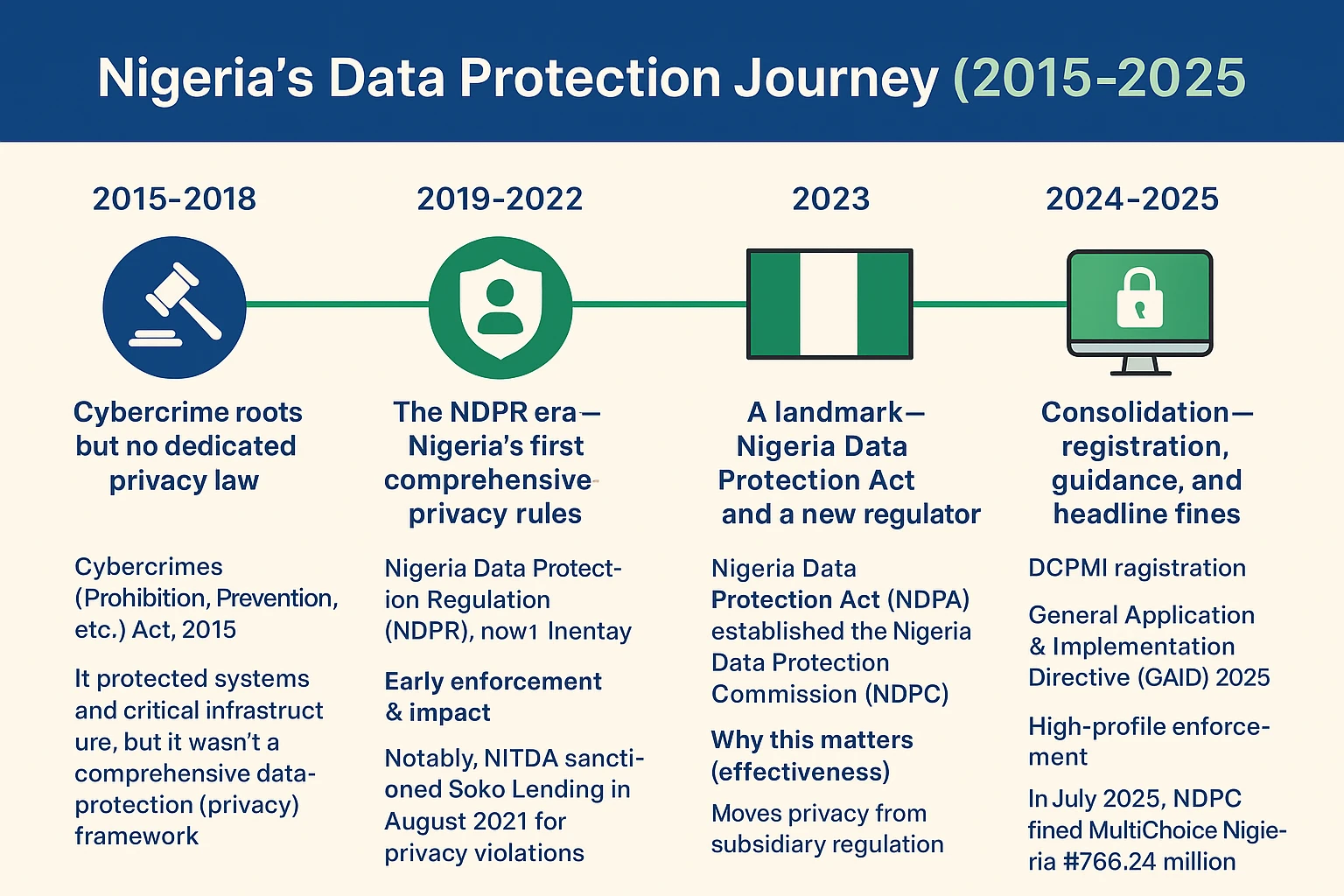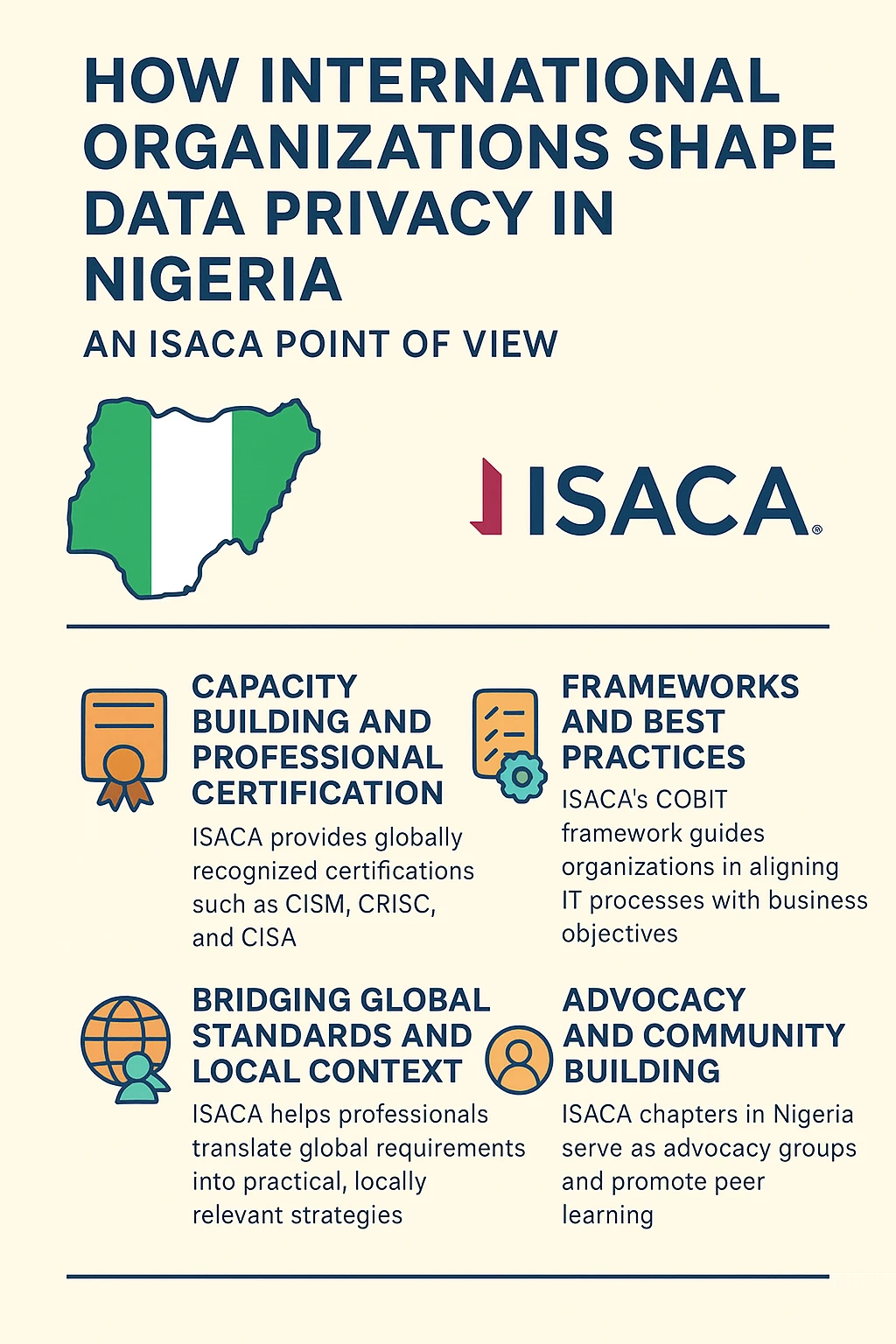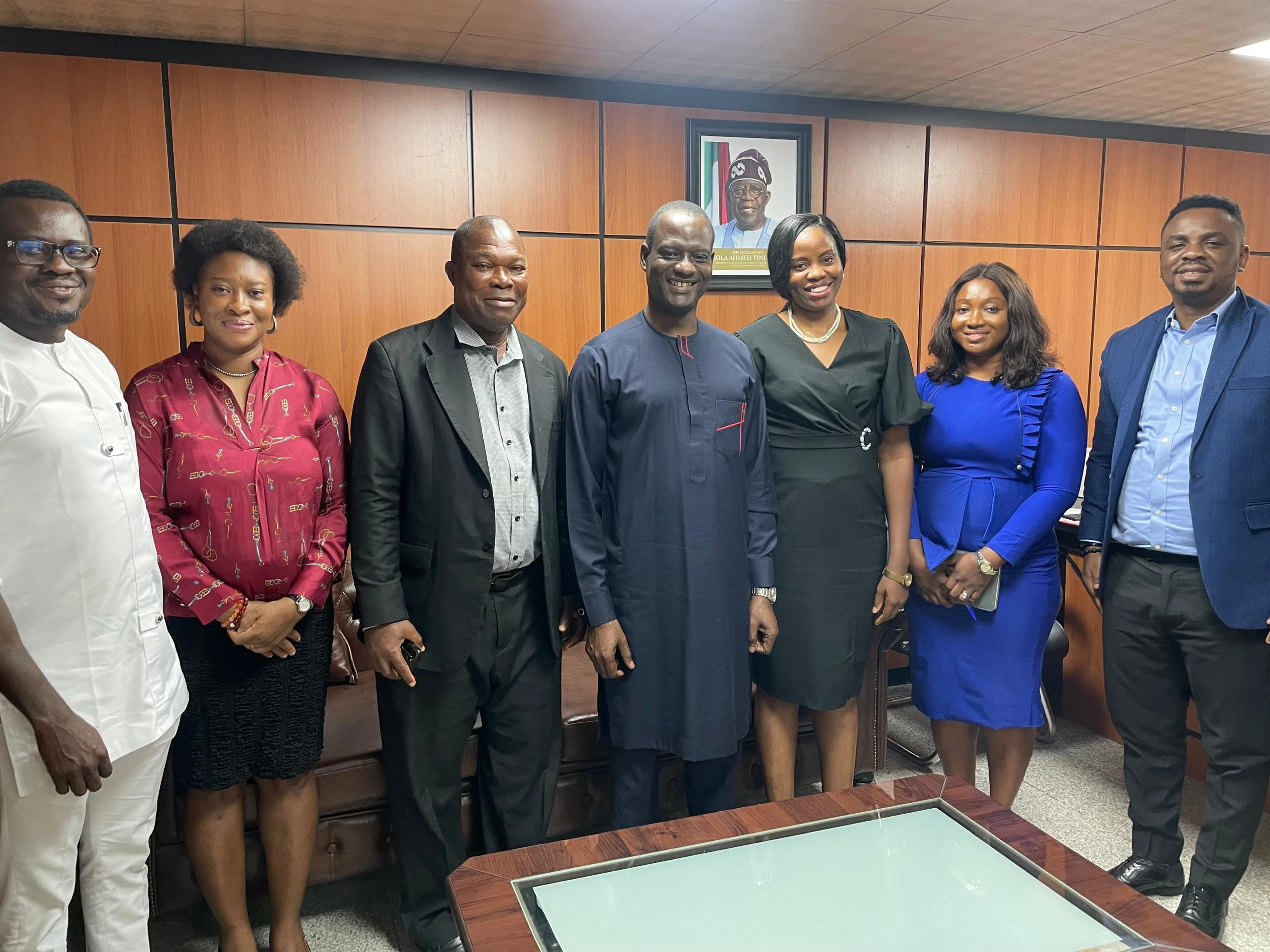Between 2015 and 2025, Nigeria’s data protection regime moved from scattered rules to a full-fledged statutory system with an empowered regulator. Below is a practical, impact-focused review of the decade what the key laws say, how they’ve been enforced, and how effective they’ve been for people, businesses, and the public sector.
2015–2018: Cybercrime roots but no dedicated privacy law
Nigeria’s modern era started with the Cybercrimes (Prohibition, Prevention, etc.) Act, 2015, which criminalised unauthorised access, system interference, and related offences. It protected systems and critical infrastructure, but it wasn’t a comprehensive data-protection (privacy) framework. (CERT Nigeria, ictpolicyafrica.org, ICLG Business Reports)
2019–2022: The NDPR era—Nigeria’s first comprehensive privacy rules
Everything changed in January 2019 when NITDA issued the Nigeria Data Protection Regulation (NDPR), Nigeria’s first GDPR-style framework. It set core principles, legal bases for processing, data-subject rights, audits, and breach reporting—plus a unique ecosystem of licensed Data Protection Compliance Organisations (DPCOs) to help companies comply. NITDA followed up with the NDPR Implementation Framework (2020) to operationalise audits, returns, and controls. (NITDA, DataGuidance)
Early enforcement & impact. Notably, NITDA sanctioned Soko Lending (Sokoloan) in August 2021 for privacy violations, imposing a ₦10 million fine and corrective measures. This became an important proof-point that the NDPR had teeth and could curb predatory data practices (e.g., debt-shaming by some digital lenders). (NITDA, ITEdgeNews)
Institutional shift. In February 2022, the Federal Government created the Nigeria Data Protection Bureau (NDPB) to lead privacy enforcement transitioning the role from NITDA and setting the stage for primary legislation. (dentonsacaslaw.com, Banwo & Ighodalo, Statehouse)
2023: A landmark Nigeria Data Protection Act and a new regulator
On June 12, 2023, the Nigeria Data Protection Act (NDPA) was signed, establishing the Nigeria Data Protection Commission (NDPC) as the national authority and giving statutory force to the data-protection regime. The Act kept earlier instruments alive where not inconsistent and aligned Nigeria with global norms on controllers/processors, principles, rights, DPIAs, cross-border transfers, and sanctions. (Nigeria Data Protection Commission, KPMG, Future of Privacy Forum)
Why this matters (effectiveness):
- Moves privacy from subsidiary regulation to an Act of Parliament, strengthening legitimacy in court and with international partners.
- Creates an independent regulator (NDPC) with clearer powers, continuity from NDPR, and a mandate to register/oversee high-impact data controllers and processors. (Nigeria Data Protection Commission)
2024–2025: Consolidation registration, guidance, and headline fines
Registration & risk-tiering. NDPC introduced the concept of Data Controllers/Processors of Major Importance (DCPMIs) and required them to register with the Commission and meet enhanced compliance and reporting obligations. Guidance notices in 2024 set timelines (e.g., mid-year deadlines and extensions into Q4 2024) and clarified who qualifies, with further updates in 2025. This is a strong compliance lever for higher-risk sectors. (PwC, Nigerian Law Firm, Global Law Experts, TEMPLARS)
General Application & Implementation Directive (GAID) 2025. On March 20, 2025, NDPC issued the GAID to harmonise interpretation and implementation of the NDPA across sectors (coming into force later in 2025). This should reduce ambiguity and improve consistency of enforcement. (Nigeria Data Protection Commission, ICLG Business Reports, Mondaq)
High-profile enforcement. In July 2025, NDPC fined MultiChoice Nigeria ₦766.24 million for intrusive processing and unlawful cross-border transfers—by far the most visible showcase of the new regime’s deterrent potential. (ITEdgeNews, Nollywood Reporter)
Public-sector scrutiny. NDPC also launched investigations into alleged data leaks or unauthorised access at NIMC in 2024, signalling widening oversight beyond the private sector and into national identity infrastructure. (Science Nigeria, DataGuidance)
Cybercrime law refresh. Amendments and commentary through 2024 continued to reinforce cyber-offences and penalties, complementing the NDPA’s civil-regulatory side with criminal deterrence. (ICLG Business Reports)
Has it worked? An impact & effectiveness scorecard
1) Legal certainty & alignment
- Nigeria now has a primary law (NDPA 2023), an independent regulator (NDPC), and operational guidance (GAID 2025)—a robust legal stack comparable to global standards. This significantly improves certainty for investors and cross-border data flows. (Nigeria Data Protection Commission, ICLG Business Reports)
2) Enforcement & deterrence
- Case outcomes (Sokoloan in 2021; MultiChoice in 2025) and ongoing probes show escalation from warnings to material penalties. Visibility of sanctions is raising executive attention and board-level risk management. (NITDA, ITEdgeNews)
3) Risk-based oversight
- DCPMI registration and deadlines (with extensions) concentrate regulatory effort where impact is highest—financial services, telcos, digital platforms, health, identity systems. Expect improved compliance via audited returns and mandated governance. (PwC, Global Law Experts)
4) Ecosystem capacity
- The DPCO model seeded a local compliance market early, which helped organisations start audits and policies. But capability varies and some SMEs still treat compliance as a “checklist” exercise rather than embedding privacy by design. (Frameworks and guidance aim to close this gap.) (DataGuidance)
5) Public-sector compliance
- Investigations around national ID data access highlight the complexity of securing large, legacy government systems and third-party verification channels. Continuous training, procurement checks, and DPIAs are still maturing. (Science Nigeria)
6) Consumer outcomes & trust
- Fewer high-profile “debt-shaming” incidents and more visible privacy policies are wins. But consistent breach notification, redress mechanisms, and public awareness need scale-up to translate rules into everyday protection.
What organisations should be doing now (2025)
1. Confirm DCPMI status and registration. If you process large volumes or sensitive categories, ensure registration and keep evidence of filings and fees. Non-compliance risks penalties and business-to-business procurement friction. (PwC)
2. Close gaps using GAID. Map the GAID’s requirements against your NDPA controls; update records of processing, legal bases, retention, DPIAs, vendor due diligence, and cross-border transfer mechanisms. (ICLG Business Reports)
3. Prepare for enforcement-grade accountability. Maintain auditable privacy governance: board reporting, metrics, incident playbooks, and independent assurance (via DPCOs or internal audit). Past fines show posture matters. (ITEdgeNews)
4. Harden third-party and API access. NIMC-related probes are a reminder to validate every integration: lawful basis, contract clauses, security, audit trails, and least-privilege access. (Science Nigeria)
What would make the regime even more effective
- Sector guidance with timelines. Prioritise finance, telecoms, health, and public identity systems with sector-specific playbooks and clear milestone dates. (GAID is a good start.) (ICLG Business Reports)
- Breach transparency norms. Publish annual stats on notifications, investigations, and outcomes to drive learning and accountability.
- Public-sector uplift. Expand mandatory DPIAs, procurement checks, and staff certification across MDAs processing identity, health, and social-service data.
- Cross-border transfer clarity. Continue issuing practical guidance on adequacy, standard clauses, and risk assessments to reduce friction for Nigerian exporters of digital services. (ICLG Business Reports)
Bottom line
From 2015’s cybercrime focus to NDPA 2023 and GAID 2025, Nigeria has built a credible, increasingly assertive privacy regime. The fine against MultiChoice and the NIMC investigations show a regulator ready to act; DCPMI registration and audits push high-impact organisations to professionalise privacy. The next leap in effectiveness will come from consistent sector guidance, visible breach reporting, and sustained uplift in public-sector compliance. If those pieces lock in, the 2015–2025 decade won’t just mark legal milestones—it will translate into everyday privacy protections Nigerians can see and feel.




Comments: